新人教版选修8Unit 5 Meeting your ancestors知识点课件(50张ppt)
文档属性
| 名称 | 新人教版选修8Unit 5 Meeting your ancestors知识点课件(50张ppt) |
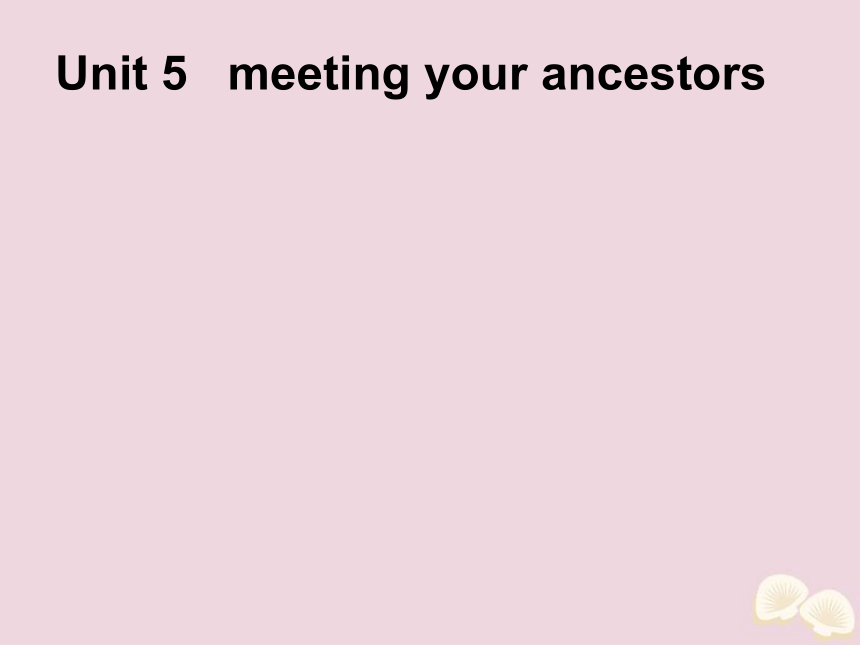
|
|
| 格式 | zip | ||
| 文件大小 | 615.5KB | ||
| 资源类型 | 教案 | ||
| 版本资源 | 人教版(新课程标准) | ||
| 科目 | 英语 | ||
| 更新时间 | 2019-08-25 00:00:00 | ||
图片预览

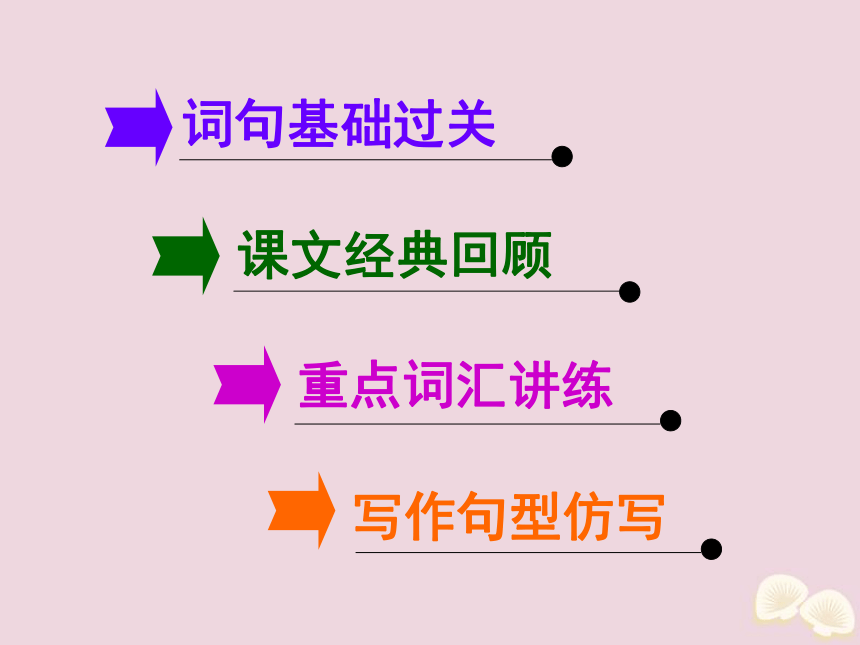


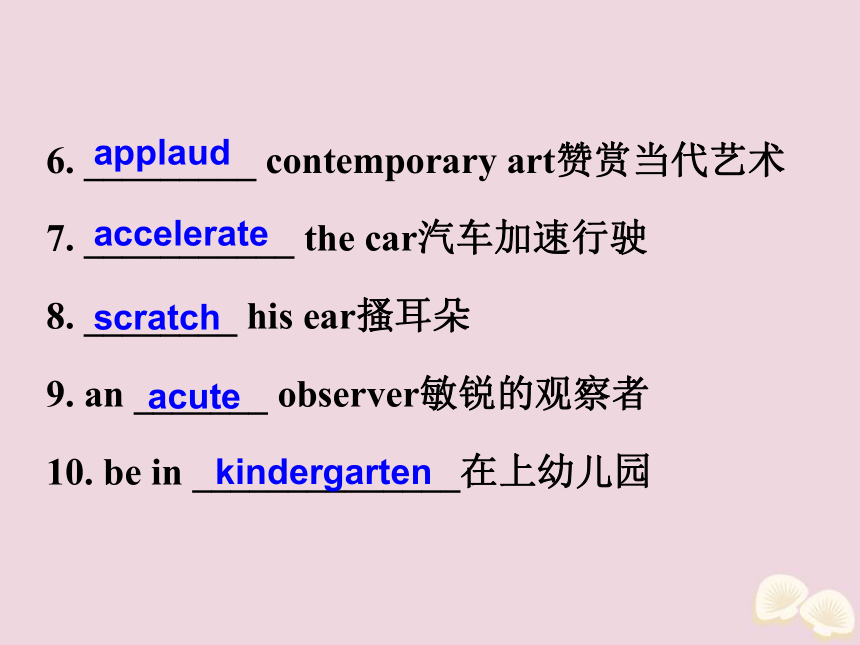
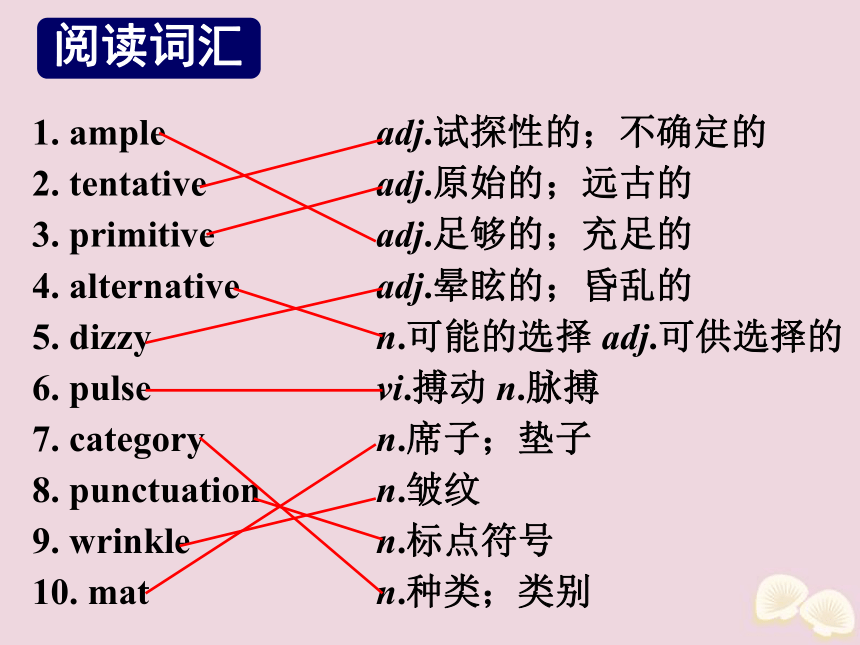

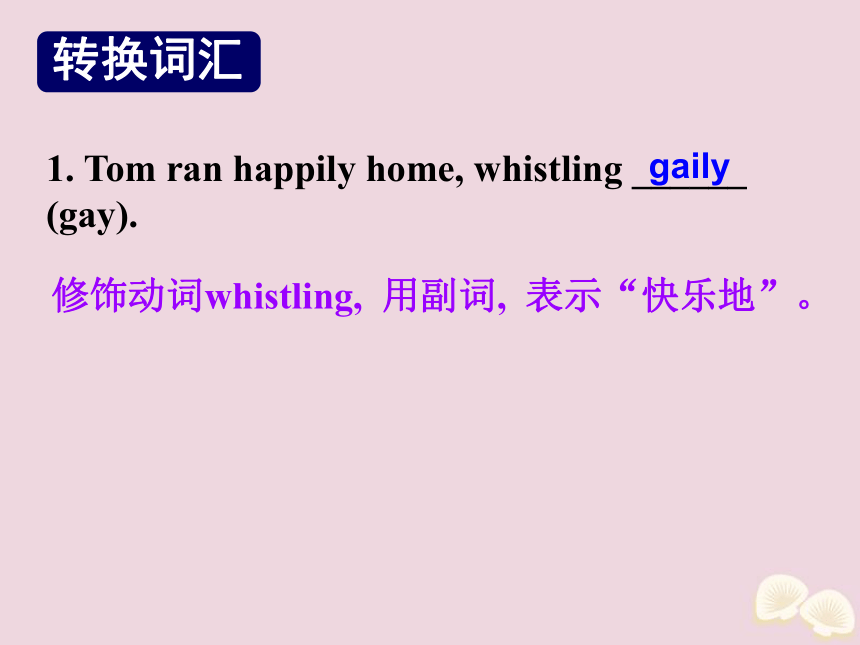


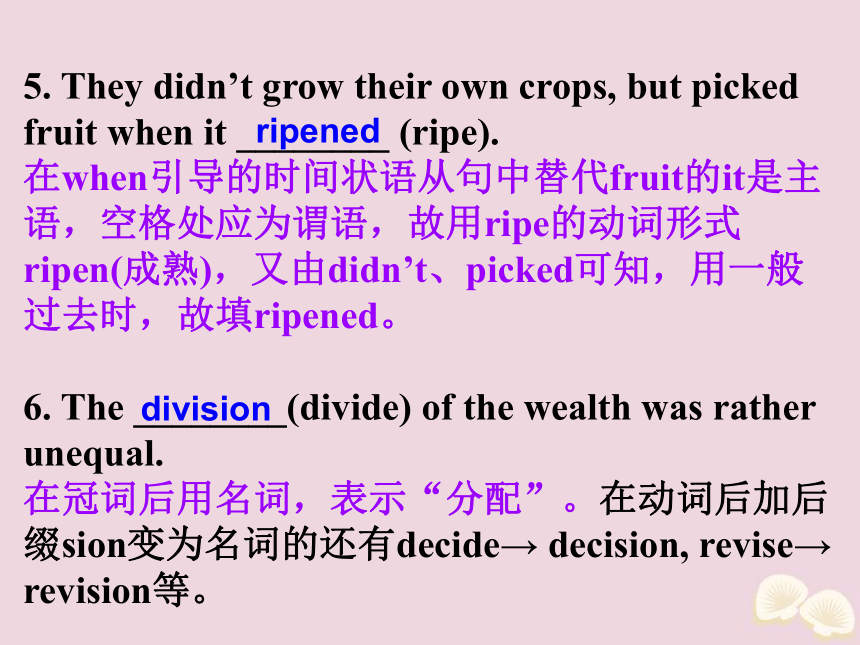
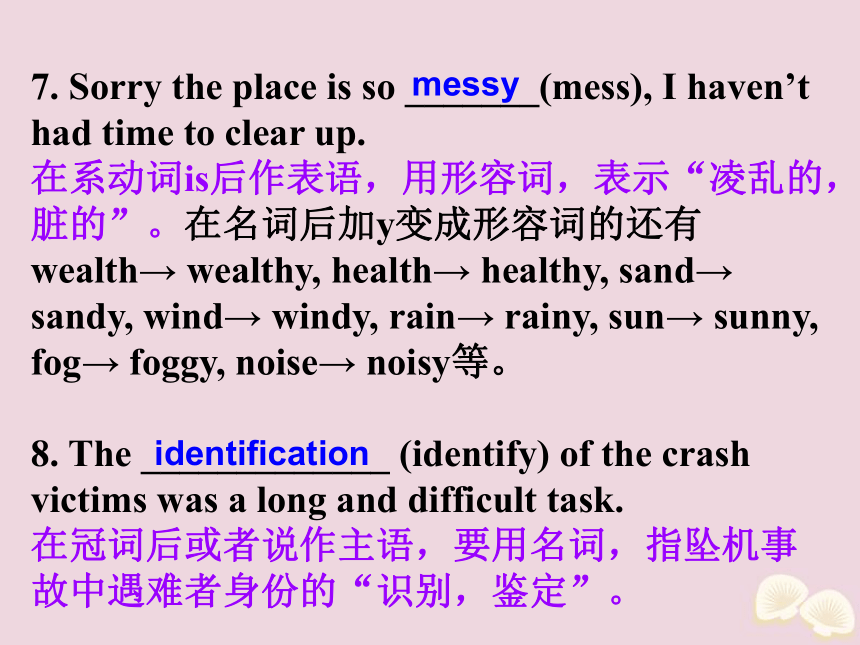
文档简介
(共50张PPT)
Unit 5 meeting your ancestors
课文经典回顾
重点词汇讲练
写作句型仿写
词句基础过关
1. _________ your conversation打断你们的谈话
2. ________ him to be innocent假定他是清白的
3. ________ illegal hunters逮捕非法捕猎者
4. don’t _____ in public不要在公共场所吐痰
5. _______ the last paragraph删除最后一段
interrupt
assume
arrest
spit
delete
6. _________ contemporary art赞赏当代艺术
7. ___________ the car汽车加速行驶
8. ________ his ear搔耳朵
9. an _______ observer敏锐的观察者
10. be in ______________在上幼儿园
kindergarten
applaud
accelerate
scratch
acute
1. ample adj.试探性的;不确定的
2. tentative adj.原始的;远古的
3. primitive adj.足够的;充足的
4. alternative adj.晕眩的;昏乱的
5. dizzy n.可能的选择 adj.可供选择的
6. pulse vi.搏动 n.脉搏
7. category n.席子;垫子
8. punctuation n.皱纹
9. wrinkle n.标点符号
10. mat n.种类;类别
11. seashell n.(各种)瓜
12. quilt n.海贝壳
13. onion n.被子;棉被
14. yogurt n.洋葱
15. melon n.酸乳酪;酸奶
16. spear n.铁锤;锤子
17. hammer n.野兽
18. beast n.滑板
19. skateboard n.相册;集邮册
20. album n.矛;枪
1. Tom ran happily home, whistling ______ (gay).
修饰动词whistling, 用副词, 表示“快乐地”。
gaily
2. After a few years, he became very ________ (skill) at drawing.
在系动词became后作表语,用形容词,表示“有技巧的,熟练的”。be skillful at意为“熟练,擅长,精通”。
由名词或动词加后缀ful变形容词的还有很多,如care→ careful, cheer→ cheerful, forget→ forgetful, harm→ harmful, help→ helpful, hope→ hopeful, pain→ painful, peace→ peaceful, power→ powerful, success→ successful, thank→ thankful, use→ useful, wonder→ wonderful等。
skilful
3. The boy is sharpening his pencils with a ___________ (sharp).
在冠词后或者说作介词的宾语,用名词,表示“卷笔刀”。
由形容词加后缀en变成动词的还有fright→ frighten, deep→ deepen, broad→ broaden等。
4. Many people suffered from __________ (starve) because of a lack of food.
作介词的宾语用名词,表示“挨饿”。
sharpener
starvation
5. They didn’t grow their own crops, but picked fruit when it ________ (ripe).
在when引导的时间状语从句中替代fruit的it是主语,空格处应为谓语,故用ripe的动词形式ripen(成熟),又由didn’t、picked可知,用一般过去时,故填ripened。
6. The ________(divide) of the wealth was rather unequal.
在冠词后用名词,表示“分配”。在动词后加后缀sion变为名词的还有decide→ decision, revise→ revision等。
division
ripened
7. Sorry the place is so _______(mess), I haven’t had time to clear up.
在系动词is后作表语,用形容词,表示“凌乱的,脏的”。在名词后加y变成形容词的还有wealth→ wealthy, health→ healthy, sand→ sandy, wind→ windy, rain→ rainy, sun→ sunny, fog→ foggy, noise→ noisy等。
8. The _____________ (identify) of the crash victims was a long and difficult task.
在冠词后或者说作主语,要用名词,指坠机事故中遇难者身份的“识别,鉴定”。
messy
identification
9. I am very much pleased by your _________ (analyse) of the situation.
在形容词性物主代词your后或者说作介词by的宾语,用名词,表示“分析”。
10. We cannot guarantee the ________ (accurate) of these figures.
在冠词后用名词,表示“精确,准确”。
analysis
accuracy
11. Last week we visited the South China __________ (botany) Garden in Guangzhou.
在名词garden前作定语,用形容词,botanical garden意为“植物园”。
12. The school offers a ___________(system) course in reading.
在名词前作定语用形容词,表示“有系统的”。
Botanical
systematic
13. He reacquired an __________ (academy) reputation after five years of hard work.
在名词前作定语,用形容词,指重新获得“学术上的”威望。
14. _____________ (radioactive) is a special quality of radium.
作主语用名词,表示“放射性”。
academic
Radioactivity
15. The girl doubles as secretary and ____________ (reception).
与名词secretary (秘书)并列,一起作介词as的宾语,用表示职业或身份的名词receptionist,表示“接待员”。
这类由名词加后缀ist变为表示职业或身份的
词还有tour→ tourist, novel→ novelist, violin→ violinist等。
receptionist
1. cut ____ the meat把肉切碎
2. attach significance ____重视
3. lie in wait ____ sb隐蔽静候某人
4. look _______向前看;为将来打算
5. be ____ low spirits心情很郁闷
up
to
for
ahead
in
6. __________________________吸引某人的注意
7. ____________ Roman times追溯到罗马时代
8. be fed up ______ this weather厌烦这种天气
9. ____________others’ feelings不顾别人的感受
10. stay for two days _______ 最多呆两天
at most
arrest/catch/draw one’s attention
date back to
with
regardless of
1. So we think ____is reasonable to assume they lived in these caves, regardless _____the cold. 因此,我们有理由认为他们不顾严寒,就住在这些洞穴里。
2. Abruptly she sat down,only to be scooped up by her laughing, __________(shout) sister,Luna.她突然坐了下去,结果被她正又笑又嚷的妹妹鲁娜一把抱了起来。
3. ____ only it could be just like last year. 要是能跟去年那样有多好啊!
it
of
shouting
If
4. _____________ (hear) wolves howling in
the forest, Lala accelerated her walk up the
path ____ the caves fearing that there might
be wild beasts ______ (lie) in wait for her.听着
狼在森林里嗥叫,拉拉沿着回洞穴的路走着,她的步伐加快了,担心会有野兽埋伏袭击她。
5. She had almost reached her destination ______ a delicious smell arrested her progress and she stopped.快到目的地的时候,一阵香
气扑鼻,她不往前走了,停了下来。
when
Having heard
to
lying
A group of students from England has come
to the Zhoukoudian Cave for a visit. 1 _____ archaeologist is showing them around. The archaeologists have been excavating here for many years. After 2 ________(find) human and animal bones 3 ____ those caves higher up the hill as well as tools and ornaments, they think it 4 ___________(reason) to assume they lived in these caves, regardless of the cold. They discovered fireplaces in the center of the caves
5 ________ they constructed fires.
An
finding
in
reasonable
where
Some evidence 6 __________(suggest) that
our ancestors did wear clothes 7 _______(make)
from animal skins. The archaeologist also shows the students a primitive necklace preserved quite well. Indeed, as the botanical analysis has been
8 _________ (special) showing us, all the fields around here used 9 _______(be) part of a large shallow lake. Perhaps there was trade between early people or they traveled to the seaside on
10 ______ (they) journeys.
their
suggests
made
specially
to be
Our evidence suggests that they do wear
clothes made from animal skins. We continue discovering tools that was sharpeners for other
tools. It seemed that they used the sharpened
stone tools to cut up animals and remove off their skin.
Then smaller scrapers were probably used to removing the fat and meat off the skin. After
that they would rub an ample amount of salts
onto the skin to make it softly. Finally, we would
cut it and sew the pieces together. Quite difficult and messy task!
1. do→ did 表示强调,意为他们当时“的确”
穿了衣服。
2. was→ were 关系代词that指代的是先行词tools,是复数。
3. seemed→ seems 指现在看起来好像如何,
用一般现在时。
4. 去掉remove后的off 因remove本身是及物动词,表示“移开,去掉”,后面不再接off或away之类的词。
5. removing→ remove 表示“被用来做某事”,用动词原形。
6. off→ from 由remove…from...(把……从……移走)可知。
7. salts→ salt 因作“食盐”解的salt是不可
数名词,没有复数形式。
8. softly→ soft 作补语要用形容词。
9. we→ they 指上句中提到的they。
10. 在quite后加a 因task是可数名词,表示“一项”任务。
interrupt sb/ sth with… 用…打扰/ 打断…
be interrupted by… 被……打断
without interruption未被打断的
1. interrupt v. 打断……讲话;打岔;中断
interruption n.中断;打扰
⑴ His speech __________________________
_________ (不断被掌声打断).
⑵ Don’t _____________ (不要打扰我)while I’m busy.
interrupt me
was constantly interrupted by
applause
assume sb /sth to be… 假定/假设某人/某事为……
It is assumed that… 人们认为……
Assuming (that)… 假设……;假定……
make an assumption that… 认为……;假设……
on the assumption that… 在假定……的情况下
2. assume vt. 假定;假设;猜想;认为
⑴ 我们要把每次测验都当成高考来对待。
We are supposed to ______________________
the college entrance examination.
⑵ 人们认为戒烟可以帮助改善健康状况。 _________________giving up smoking can
_______________________.
help improve our health
assume every test to be
It is assumed that
regard sb/ sth as… 把某人/ 某物看做为……
3. regardless of不管;不顾
in spite of,despite不管;不顾
regard vt. 考虑;看待;把……看做
regarding prep. 关于;至于
⑴ 不管遇到什么困难,我们都要坚持下去。
We must keep on trying _________________
__________.
⑵ 本次活动任何年级的同学都可以参加。
The activity welcomes ___________________
_________.
(all) students regardless
regardless of any
difficulty
of grade
be tired of… 对……感到厌倦
be bored with… 对……厌倦了
have enough of… 对……受够了/厌倦了
4. be fed up with… 对……厌倦;受够了……
⑴ 我有点受够了漫无目标的生活。
I’m kind of _____________________________.
⑵ 越来越多的人受够了城市里污浊的空气而选择搬到乡村去住。
__________________________________, a growing number of people are moving to the countryside.
Fed up with the polluted air in the city
fed up with life without purpose
arrest sb for (doing) sth 因(做)某事逮捕某人
under arrest被捕的;在押
arrest one’s attention引起某人注意
5. arrest vt. 逮捕;吸引 n.逮捕;拘留
⑴ 新政策实施后,很多人因醉酒驾驶而被拘留了。
____________________________ drunk driving after ____________________________ .
⑵ 森林大火带来的负面影响引起了人们的广泛关注。
The negative impact caused by forest fires ___________________________ .
has arrested public attention
Many people were arrested for
the new policy was carried out
date back to=date from 追溯到;从…就有
date back to+时间点=date back+时间段追溯到…
6. date back to… 追溯到……;起源于……
date back (to)常用主动形式,多用一般现在时。
⑴ The history of Guangdong can date back to 5,000 years ago.
=The history of Guangdong ________________
________________________________.
⑵ 他对美术的兴趣源于孩提时代的一件小事。
His interest in art can date back to a little/small matter/thing in his childhood.
can date from 5,000
years ago/can date back 5,000 years
look back向后看;回顾
look into调查
look out (for…)注意;留神
look up查找
look up to… 尊敬某人
look down on/upon轻视;瞧不起
look through仔细查阅;浏览
7. look ahead向前看;为将来打算
⑴ Look _____, or you will catch a cold.
⑵ I have to look _________the notes before
the exam.
⑶ Now the police are looking _____ the case.
⑷ You had better look ____ the new words in the dictionary.
up
out
through
into
⑴ 要是我们有充分利用时间好好复习就好了!
1. if only… 要是……就好了(多用虚拟语气)
only if… 除非……;唯有……
If only we had made full use of our time to make good preparations (for the test)!
⑵ 但愿我们都能在高考中取得好成绩!
If only we all would do a good job in the college entrance examination!
⑴ 他认真地为面试做好了准备,结果却被告知面试取消了。
2. only to… 结果却做了某事 (意料之外的令人不愉快的结果)
He prepared himself well for the interview, only to be told it was canceled.
⑵ 他整整花了四年时间得到了学位,结
果却发现很难找到工作。
He spent four years (in) getting a degree, only to learn/find there were few jobs for him.
⑴ I find __________________________________
_____ (问外国人年龄是不礼貌的).
3. think it + n./ adj. +to do sth
认为做某事是……的
可用于此句型的动词还有feel、find、 consider、make 等。
it impolite to ask about a foreigner’s
age
⑵ She ______________________________
________________ (使早睡早起成了一条规律).
⑶ We all consider _____________________
_____________ (课堂上做笔记是很必要的).
made it a rule to go to bed early
it quite necessary to take
and get up early
notes in class
Thank you !
Unit 5 meeting your ancestors
课文经典回顾
重点词汇讲练
写作句型仿写
词句基础过关
1. _________ your conversation打断你们的谈话
2. ________ him to be innocent假定他是清白的
3. ________ illegal hunters逮捕非法捕猎者
4. don’t _____ in public不要在公共场所吐痰
5. _______ the last paragraph删除最后一段
interrupt
assume
arrest
spit
delete
6. _________ contemporary art赞赏当代艺术
7. ___________ the car汽车加速行驶
8. ________ his ear搔耳朵
9. an _______ observer敏锐的观察者
10. be in ______________在上幼儿园
kindergarten
applaud
accelerate
scratch
acute
1. ample adj.试探性的;不确定的
2. tentative adj.原始的;远古的
3. primitive adj.足够的;充足的
4. alternative adj.晕眩的;昏乱的
5. dizzy n.可能的选择 adj.可供选择的
6. pulse vi.搏动 n.脉搏
7. category n.席子;垫子
8. punctuation n.皱纹
9. wrinkle n.标点符号
10. mat n.种类;类别
11. seashell n.(各种)瓜
12. quilt n.海贝壳
13. onion n.被子;棉被
14. yogurt n.洋葱
15. melon n.酸乳酪;酸奶
16. spear n.铁锤;锤子
17. hammer n.野兽
18. beast n.滑板
19. skateboard n.相册;集邮册
20. album n.矛;枪
1. Tom ran happily home, whistling ______ (gay).
修饰动词whistling, 用副词, 表示“快乐地”。
gaily
2. After a few years, he became very ________ (skill) at drawing.
在系动词became后作表语,用形容词,表示“有技巧的,熟练的”。be skillful at意为“熟练,擅长,精通”。
由名词或动词加后缀ful变形容词的还有很多,如care→ careful, cheer→ cheerful, forget→ forgetful, harm→ harmful, help→ helpful, hope→ hopeful, pain→ painful, peace→ peaceful, power→ powerful, success→ successful, thank→ thankful, use→ useful, wonder→ wonderful等。
skilful
3. The boy is sharpening his pencils with a ___________ (sharp).
在冠词后或者说作介词的宾语,用名词,表示“卷笔刀”。
由形容词加后缀en变成动词的还有fright→ frighten, deep→ deepen, broad→ broaden等。
4. Many people suffered from __________ (starve) because of a lack of food.
作介词的宾语用名词,表示“挨饿”。
sharpener
starvation
5. They didn’t grow their own crops, but picked fruit when it ________ (ripe).
在when引导的时间状语从句中替代fruit的it是主语,空格处应为谓语,故用ripe的动词形式ripen(成熟),又由didn’t、picked可知,用一般过去时,故填ripened。
6. The ________(divide) of the wealth was rather unequal.
在冠词后用名词,表示“分配”。在动词后加后缀sion变为名词的还有decide→ decision, revise→ revision等。
division
ripened
7. Sorry the place is so _______(mess), I haven’t had time to clear up.
在系动词is后作表语,用形容词,表示“凌乱的,脏的”。在名词后加y变成形容词的还有wealth→ wealthy, health→ healthy, sand→ sandy, wind→ windy, rain→ rainy, sun→ sunny, fog→ foggy, noise→ noisy等。
8. The _____________ (identify) of the crash victims was a long and difficult task.
在冠词后或者说作主语,要用名词,指坠机事故中遇难者身份的“识别,鉴定”。
messy
identification
9. I am very much pleased by your _________ (analyse) of the situation.
在形容词性物主代词your后或者说作介词by的宾语,用名词,表示“分析”。
10. We cannot guarantee the ________ (accurate) of these figures.
在冠词后用名词,表示“精确,准确”。
analysis
accuracy
11. Last week we visited the South China __________ (botany) Garden in Guangzhou.
在名词garden前作定语,用形容词,botanical garden意为“植物园”。
12. The school offers a ___________(system) course in reading.
在名词前作定语用形容词,表示“有系统的”。
Botanical
systematic
13. He reacquired an __________ (academy) reputation after five years of hard work.
在名词前作定语,用形容词,指重新获得“学术上的”威望。
14. _____________ (radioactive) is a special quality of radium.
作主语用名词,表示“放射性”。
academic
Radioactivity
15. The girl doubles as secretary and ____________ (reception).
与名词secretary (秘书)并列,一起作介词as的宾语,用表示职业或身份的名词receptionist,表示“接待员”。
这类由名词加后缀ist变为表示职业或身份的
词还有tour→ tourist, novel→ novelist, violin→ violinist等。
receptionist
1. cut ____ the meat把肉切碎
2. attach significance ____重视
3. lie in wait ____ sb隐蔽静候某人
4. look _______向前看;为将来打算
5. be ____ low spirits心情很郁闷
up
to
for
ahead
in
6. __________________________吸引某人的注意
7. ____________ Roman times追溯到罗马时代
8. be fed up ______ this weather厌烦这种天气
9. ____________others’ feelings不顾别人的感受
10. stay for two days _______ 最多呆两天
at most
arrest/catch/draw one’s attention
date back to
with
regardless of
1. So we think ____is reasonable to assume they lived in these caves, regardless _____the cold. 因此,我们有理由认为他们不顾严寒,就住在这些洞穴里。
2. Abruptly she sat down,only to be scooped up by her laughing, __________(shout) sister,Luna.她突然坐了下去,结果被她正又笑又嚷的妹妹鲁娜一把抱了起来。
3. ____ only it could be just like last year. 要是能跟去年那样有多好啊!
it
of
shouting
If
4. _____________ (hear) wolves howling in
the forest, Lala accelerated her walk up the
path ____ the caves fearing that there might
be wild beasts ______ (lie) in wait for her.听着
狼在森林里嗥叫,拉拉沿着回洞穴的路走着,她的步伐加快了,担心会有野兽埋伏袭击她。
5. She had almost reached her destination ______ a delicious smell arrested her progress and she stopped.快到目的地的时候,一阵香
气扑鼻,她不往前走了,停了下来。
when
Having heard
to
lying
A group of students from England has come
to the Zhoukoudian Cave for a visit. 1 _____ archaeologist is showing them around. The archaeologists have been excavating here for many years. After 2 ________(find) human and animal bones 3 ____ those caves higher up the hill as well as tools and ornaments, they think it 4 ___________(reason) to assume they lived in these caves, regardless of the cold. They discovered fireplaces in the center of the caves
5 ________ they constructed fires.
An
finding
in
reasonable
where
Some evidence 6 __________(suggest) that
our ancestors did wear clothes 7 _______(make)
from animal skins. The archaeologist also shows the students a primitive necklace preserved quite well. Indeed, as the botanical analysis has been
8 _________ (special) showing us, all the fields around here used 9 _______(be) part of a large shallow lake. Perhaps there was trade between early people or they traveled to the seaside on
10 ______ (they) journeys.
their
suggests
made
specially
to be
Our evidence suggests that they do wear
clothes made from animal skins. We continue discovering tools that was sharpeners for other
tools. It seemed that they used the sharpened
stone tools to cut up animals and remove off their skin.
Then smaller scrapers were probably used to removing the fat and meat off the skin. After
that they would rub an ample amount of salts
onto the skin to make it softly. Finally, we would
cut it and sew the pieces together. Quite difficult and messy task!
1. do→ did 表示强调,意为他们当时“的确”
穿了衣服。
2. was→ were 关系代词that指代的是先行词tools,是复数。
3. seemed→ seems 指现在看起来好像如何,
用一般现在时。
4. 去掉remove后的off 因remove本身是及物动词,表示“移开,去掉”,后面不再接off或away之类的词。
5. removing→ remove 表示“被用来做某事”,用动词原形。
6. off→ from 由remove…from...(把……从……移走)可知。
7. salts→ salt 因作“食盐”解的salt是不可
数名词,没有复数形式。
8. softly→ soft 作补语要用形容词。
9. we→ they 指上句中提到的they。
10. 在quite后加a 因task是可数名词,表示“一项”任务。
interrupt sb/ sth with… 用…打扰/ 打断…
be interrupted by… 被……打断
without interruption未被打断的
1. interrupt v. 打断……讲话;打岔;中断
interruption n.中断;打扰
⑴ His speech __________________________
_________ (不断被掌声打断).
⑵ Don’t _____________ (不要打扰我)while I’m busy.
interrupt me
was constantly interrupted by
applause
assume sb /sth to be… 假定/假设某人/某事为……
It is assumed that… 人们认为……
Assuming (that)… 假设……;假定……
make an assumption that… 认为……;假设……
on the assumption that… 在假定……的情况下
2. assume vt. 假定;假设;猜想;认为
⑴ 我们要把每次测验都当成高考来对待。
We are supposed to ______________________
the college entrance examination.
⑵ 人们认为戒烟可以帮助改善健康状况。 _________________giving up smoking can
_______________________.
help improve our health
assume every test to be
It is assumed that
regard sb/ sth as… 把某人/ 某物看做为……
3. regardless of不管;不顾
in spite of,despite不管;不顾
regard vt. 考虑;看待;把……看做
regarding prep. 关于;至于
⑴ 不管遇到什么困难,我们都要坚持下去。
We must keep on trying _________________
__________.
⑵ 本次活动任何年级的同学都可以参加。
The activity welcomes ___________________
_________.
(all) students regardless
regardless of any
difficulty
of grade
be tired of… 对……感到厌倦
be bored with… 对……厌倦了
have enough of… 对……受够了/厌倦了
4. be fed up with… 对……厌倦;受够了……
⑴ 我有点受够了漫无目标的生活。
I’m kind of _____________________________.
⑵ 越来越多的人受够了城市里污浊的空气而选择搬到乡村去住。
__________________________________, a growing number of people are moving to the countryside.
Fed up with the polluted air in the city
fed up with life without purpose
arrest sb for (doing) sth 因(做)某事逮捕某人
under arrest被捕的;在押
arrest one’s attention引起某人注意
5. arrest vt. 逮捕;吸引 n.逮捕;拘留
⑴ 新政策实施后,很多人因醉酒驾驶而被拘留了。
____________________________ drunk driving after ____________________________ .
⑵ 森林大火带来的负面影响引起了人们的广泛关注。
The negative impact caused by forest fires ___________________________ .
has arrested public attention
Many people were arrested for
the new policy was carried out
date back to=date from 追溯到;从…就有
date back to+时间点=date back+时间段追溯到…
6. date back to… 追溯到……;起源于……
date back (to)常用主动形式,多用一般现在时。
⑴ The history of Guangdong can date back to 5,000 years ago.
=The history of Guangdong ________________
________________________________.
⑵ 他对美术的兴趣源于孩提时代的一件小事。
His interest in art can date back to a little/small matter/thing in his childhood.
can date from 5,000
years ago/can date back 5,000 years
look back向后看;回顾
look into调查
look out (for…)注意;留神
look up查找
look up to… 尊敬某人
look down on/upon轻视;瞧不起
look through仔细查阅;浏览
7. look ahead向前看;为将来打算
⑴ Look _____, or you will catch a cold.
⑵ I have to look _________the notes before
the exam.
⑶ Now the police are looking _____ the case.
⑷ You had better look ____ the new words in the dictionary.
up
out
through
into
⑴ 要是我们有充分利用时间好好复习就好了!
1. if only… 要是……就好了(多用虚拟语气)
only if… 除非……;唯有……
If only we had made full use of our time to make good preparations (for the test)!
⑵ 但愿我们都能在高考中取得好成绩!
If only we all would do a good job in the college entrance examination!
⑴ 他认真地为面试做好了准备,结果却被告知面试取消了。
2. only to… 结果却做了某事 (意料之外的令人不愉快的结果)
He prepared himself well for the interview, only to be told it was canceled.
⑵ 他整整花了四年时间得到了学位,结
果却发现很难找到工作。
He spent four years (in) getting a degree, only to learn/find there were few jobs for him.
⑴ I find __________________________________
_____ (问外国人年龄是不礼貌的).
3. think it + n./ adj. +to do sth
认为做某事是……的
可用于此句型的动词还有feel、find、 consider、make 等。
it impolite to ask about a foreigner’s
age
⑵ She ______________________________
________________ (使早睡早起成了一条规律).
⑶ We all consider _____________________
_____________ (课堂上做笔记是很必要的).
made it a rule to go to bed early
it quite necessary to take
and get up early
notes in class
Thank you !
